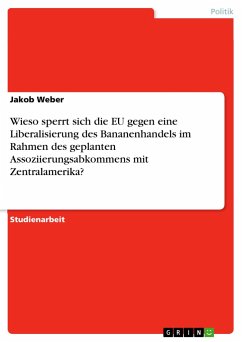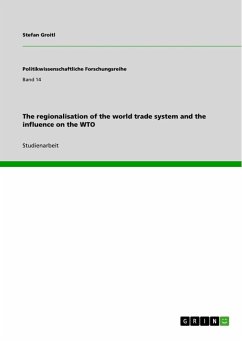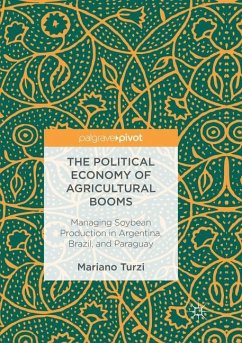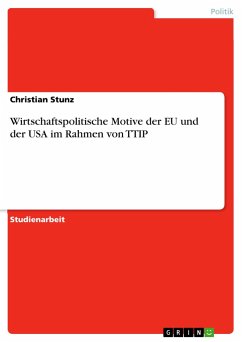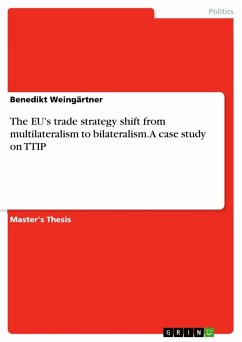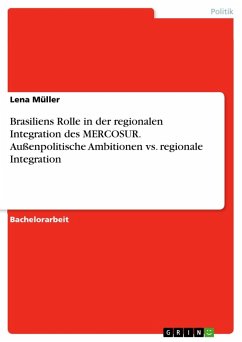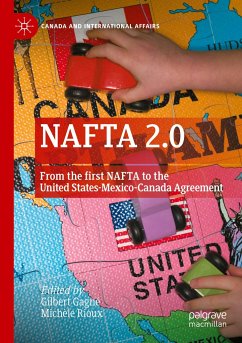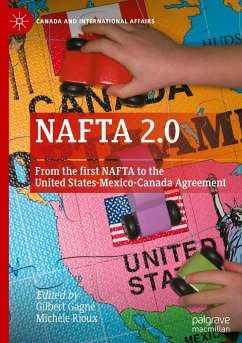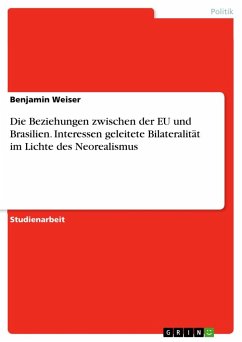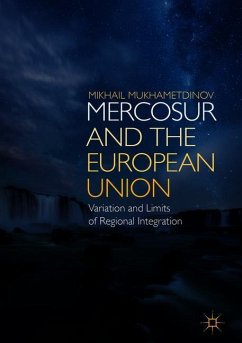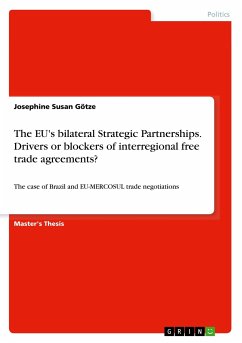
The EU's bilateral Strategic Partnerships. Drivers or blockers of interregional free trade agreements?
The case of Brazil and EU-MERCOSUL trade negotiations

PAYBACK Punkte
0 °P sammeln!
Master's Thesis from the year 2018 in the subject Politics - International Politics - Topic: European Union, grade: 1,0, University of Cologne (Lehrstuhl für internationale Politik und Außenpolitik), language: English, abstract: At the beginning of the 21st century, the international system is characterised by ever increasing interdependence, forcing actors to re-organise their relations. The new overlapping foreign policy instruments and cooperation formats on a bilateral, (sub)regional, interregional and multilateral level, in which states pursue different strategies for the assertion of i...
Master's Thesis from the year 2018 in the subject Politics - International Politics - Topic: European Union, grade: 1,0, University of Cologne (Lehrstuhl für internationale Politik und Außenpolitik), language: English, abstract: At the beginning of the 21st century, the international system is characterised by ever increasing interdependence, forcing actors to re-organise their relations. The new overlapping foreign policy instruments and cooperation formats on a bilateral, (sub)regional, interregional and multilateral level, in which states pursue different strategies for the assertion of interests, result in constellations that can be favourable but are often problematic for the conclusion of free trade agreements (FTAs). The EU, only recently having started to develop a common foreign policy and institutionalising relations with partners on a bilateral, interregional and multilateral level, is not free from this problem. Following an incoherent foreign trade policy, in which it shifts from bilateral (South Africa) to interregional (South East Asia) an mixed strategies (South America), the Union faces challenges in the conclusion of interregional FTAs. A current example is the ongoing bloc-to-bloc trade negotiations with the MERCOSUL (Mercado Comum do Sul in Portuguese or Common Market of the South in English) countries and the recent establishment of a bilateral SP with the MERCOSUL member Brazil that aims at cooperation on several topics, including trade. In the literature, attention has been paid to regionalisation and interregionalism, as well as the duality of the EU's biregional relations and bilateral SPs creating chances and limits of global policy-making. But although trade has played a prominent role in the study of interregional relations, attempts to link the duality of biregional and bilateral approaches in EU foreign policy with foreign trade policy-making have been modest. This study provides an in-depth analysis of the impact of the EU'sbilateral SP with third states on the Union's ability to conclude FTAs with economic blocs the SP is integrated with. A single case study, focusing on the coexistence of interregional EU-MERCOSUL FTA negotiations and the bilateral SP between the EU and Brazil, analyses the SP's value as an EU foreign policy instrument for the enhancement of negotiations on interregional FTAs.




